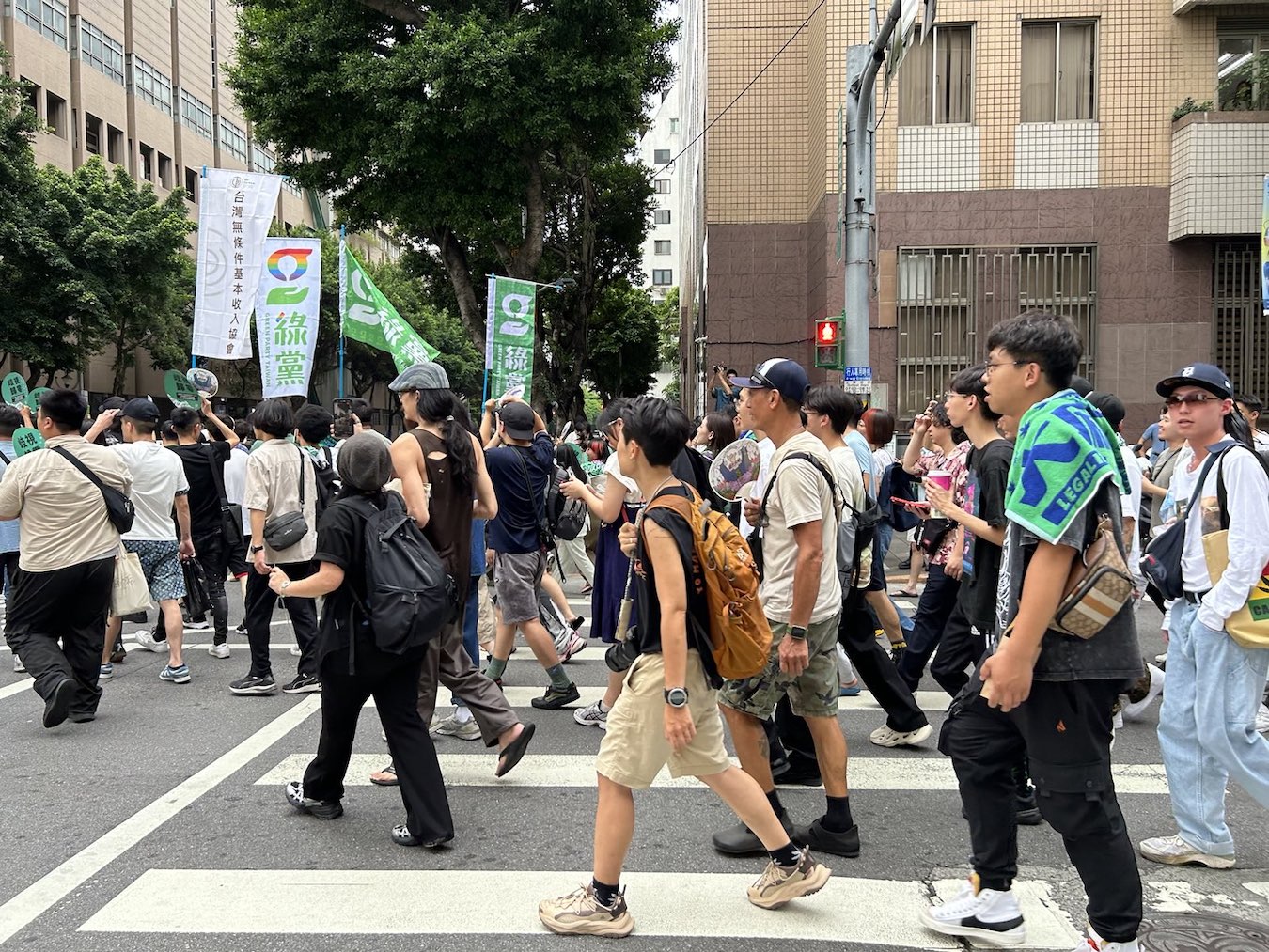by Brian Hioe
語言:
English
Photo Credit: Brian Hioe
CANNABIS DECRIMINALIZATION ADVOCATES gathered outside of the Legislative Yuan today to mark 420, a day commemorated internationally by cannabis users and advocates.
Rallies to demonstrate for the decriminalization of cannabis now occur annually in Taiwan, having begun in 2019. These are often gatherings for Taiwanese counterculture, featuring musical performances, speeches, a market, and a demonstration parade. Past rallies have taken place outside of the legislature on several occasions, though also in Liberty Plaza.
 Photo credit: Brian Hioe
Photo credit: Brian Hioe
This was the case this year as well, with a number of vendors selling smoke paraphernalia, clothing made of hemp, t-shirts with cannabis-related slogans or images, prints, and other merchandise. Some vendors also sold food. A color stage was set up for speeches and performances. Several political groups, such as the Green Party Taiwan and UBI Taiwan, were present, though this year saw less participation from political parties compared to previous years. This may have been due to the Among the musical acts that performed were Savage.M, BR & IronBO$$, 勁爆羅雷, Setback Line, Thaiboy 41, and Acrack 47.
In particular, speakers drew attention to the medical applications of cannabis, as a path for decriminalization, and in terms of its ability to alleviate the suffering of elderly individuals with long-term medical conditions. Western countries that have decriminalized cannabis were raised as examples for Taiwan, though the pushback in Thailand against cannabis was also referenced. Taiwan’s drug laws were historically linked to those of the US, in that Taiwan largely mimicked the US in adopting strict drug laws. But at a time in which the US has decriminalized cannabis, Taiwan has not followed suit. To this extent, some of the speakers highlighted how cannabis was not more or less dangerous than other substances, including parents who emphasized their identity as parents in order to destigmatize cannabis advocates as dangerous social miscreants. E-cigarettes and vaping were banned in May 2023.
As in past years, the rally had heavy police presence, which reflects the social view of advocates for cannabis use as dangerous. Sniffer dogs checked the bags of those entering the market area and stage, which was walled off, and police patrolled through the area multiple times.
 Photo credit: Brian Hioe
Photo credit: Brian Hioe
At 4:20 PM, a march set out from the market, with moderators counting down until 4:20 PM. The march walked once around the Legislative Yuan before returning to the site of the market, with participants searched again by police to enter the market. During the brief march, participants shouted slogans calling for the social destigmatization of cannabis.
Despite Taiwan being celebrated for its political progressiveness in past years, cannabis decriminalization, as well as attitudes toward drugs, are one aspect in which social attitudes remain highly conservative. Namely, drug users are still thought of as dangerous and violent, resulting in harsh legal punishments against drug users. It was raised during the rally today, for example, by speakers that entertainer Mickey Huang–who faced charges regarding #MeToo allegations and was later found to have sexual videos featuring minors on a hard drive–faced lighter charges than in the case of drug use.
Indeed, political figures frequently tout Taiwan’s harsh measures against drugs with a great degree of publicity, as observed in frequent images released by the police of senior politicians inspecting confiscated items during drug busts. To this extent, police regularly shut down nightlife establishments for spot inspections to check for drugs.
 Photo credit: Brian Hioe
Photo credit: Brian Hioe
This reflects how the use of drugs is often associated with young people in nightlife. Indeed, past incidents in which entertainers were found with drugs led to the police trying to use them as examples for the general public.
With many Taiwanese citizens traveling to Thailand to use cannabis after its decriminalization, the Taiwanese government has sought to assert that it would be within its rights to prosecute Taiwanese for using cannabis abroad. This has, at times, led to the Ministry of Justice seeming to take the view in 2023 that advocating for the decriminalization of cannabis would constitute incitement to use drugs, something that would lead to charges.his stance raised free speech concerns among activists at the time. Though there has not been an active push on this stance since then, it is to be seen whether the government would try to target annual 420 rallies, particularly if some incident leads to social pushback against drugs.

